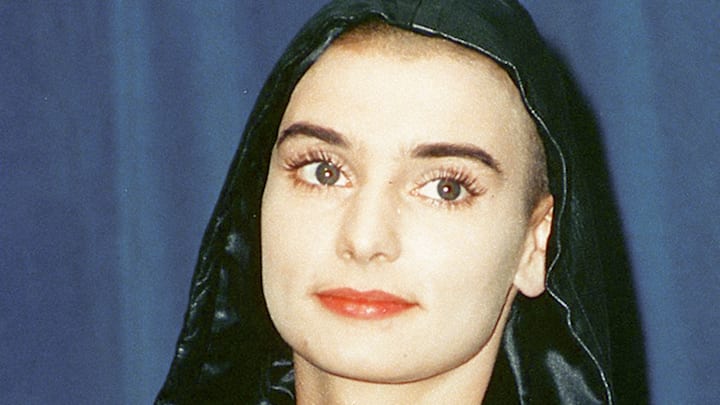Grammy award winning Irish singer and musician Sinéad O'Connor has died at the age of 56. This was announced by her family, who has requested privacy during this time. As is customary with the passing of celebrities, it is a time to reflect on their career and recollect significant milestones. One such case for O'Connor occurred at Bob Dylan's 30th-anniversary concert in 1992.
There is one curious detail about the Bob Dylan 30th anniversary concert live album released in 1992. That year marked the thirtieth anniversary of Bob Dylan’s recording career, and the concert was a star-studded tribute featuring The Band, Johnny Cash, Stevie Wonder, Kris Kristofferson, Roger McGuinn, George Harrison, Tom Petty, and Lou Reed, among others. The closing track on the live album is a haunting and intimate rendition of Dylan’s "I Believe In You" by Sinéad O'Connor. Except, if you look at the track listing, the brackets after "I Believe In You" says “Afternoon Rehearsal.” Sinéad O'Connor’s track comes from the rehearsal, not the show itself. Why?
A defining moment in Sinéad O'Connor’s career
Thirteen days before that, O’Connor had performed on Saturday Night Live. She was scheduled to close the show with an a capella cover of Bob Marley’s "War," with lyrics changed to protest child abuse rather than racism. While singing the song’s refrain, “good over evil,” she presented a photograph of the pope and tore it up at the song's conclusion, adding, “Fight the real enemy.”
O’Connor described what happened next in her 2021 memoir Rememberings… “When I walk backstage, literally not a human being is in sight. All doors have closed. Everyone has vanished. Including my own manager, who locks himself in his room for three days and unplugs his phone.” Producer Lorne Michaels had the “applause” sign turned off, leading to a heavy silence as she left the stage. NBC received nearly 900 complaints over Sunday and Monday; seven supported O’Connor. In total, the network received 4,400 complaints.
NBC banned her for life. Frank Sinatra told an audience in New Jersey, "This must be one stupid broad… I’d kick her a** if she were a guy.” While actor Joe Pesci, who hosted SNL the week after, told the audience that he would have “given her a smack.”
At the Bob Dylan tribute show, O’Connor was introduced by Kris Kristofferson, saying, “I’m real proud to introduce this next artist whose name became synonymous with courage and integrity,” but as the band started up, they were overpowered by boos and jeering. After an abortive second attempt, O’Connor attempted to pivot to "War," the song she’d performed on SNL, but it was no use; she was forced off the stage, where Kristofferson embraced her, telling her, “Don’t let the bastards get you down.”
When you listen to the live album, "I Believe In You," ironically a religiously revenant song from Dylan’s gospel period, it takes on an even eerier quality as if O’Connor is sending a plaintive whispered message from somewhere in exile. Of course, plaintive whispers were not the usually outspoken O’Connor’s native language, but at this point, the wound was still fresh; it would’ve been churlish not to forgive a little quiet vulnerability from her. "I Believe In You" bears all the pain she must’ve felt over that fortnight.
As a defining moment in O’Connor’s career, the SNL incident is an object lesson in who is and is not allowed to be irreverent or speak truth to power. The Beatles survived John Lennon's remark that they were more popular than Jesus, after all, and that was a quarter of a century before this. The fans in the audience at the Bob Dylan tribute show quite rightly venerated Saint Bob for being an iconoclast. Why couldn't they extend that courtesy to this young woman?
Many say that the SNL incident derailed O'Connor’s career and is to blame for her one-hit-wonder status. But O'Connor sees it differently. In that memoir, she wrote, "I feel that having a number-one record derailed my career and my tearing the photo put me back on the right track. I had to make my living performing live again. And that’s what I was born for. I wasn’t born to be a pop star. You have to be a good girl for that. Not be too troubled." I am glad that O'Connor made her peace with what happened because many involved in this story owe her an apology.
